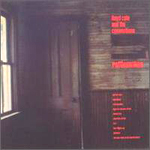Are Your Ready To Be Heartbroken?

But fifteen-year-olds are (or, at least, should be) allowed the luxury of surrendering their identities to pop music, because the leisure time in which to do so is never as great - and the consequences of the delusion that doing so somehow makes you special are never so minor - again. Plus, anyone older than, say, nineteen who believes that looking like Robert Smith is the key to self-actualization is invariably fucking stupid. Just look at Robert Smith.
Lloyd Cole was a 23-year-old philosophy undergraduate when he and his band, the Commotions, recorded Rattlesnakes, and, as much as it should be a recipe for disaster, Coleís unlikely, decidedly un-pop-star credentials are exactly what made his debut album so seductive. If his lyrics were at all an indication of his actual self, Cole thought too much: he was ruinously self-analytical, romanticized everything beyond reasonable proportion, and was possibly suffering from an undiagnosed god complex. In short, Cole was me - only older, and handsome, and much more articulate, and a brilliant melodist, and not a latent homosexual. By comparison, Morrissey - to whose records most of my friends were metaphorically and literally slashing their forearms - was a gauche drama queen.
Iíve considered the idea that the Lloyd Cole who wrote Rattlesnakes was a nerd, inasmuch as nerds are people captivated by their own cleverness, but who know that being clever is never adequate compensation for being a misfit. That Cole looked like a í50s matinee idol didnít matter; his awkwardness in the bandís early videos is too convincing and embarrassing to be a calculated image of intellectual vulnerability. So, like most nerds, he constructed a fantasy world, but unlike most nerds, his talents allowed him to parlay that fantasy into an album. Rattlesnakes is stuffed with images and suggestions of overeducated, sexually indiscreet bohemians who engage in destructive, semester-long love affairs; there are reams of ostentatious references to pop icons from bygone eras (Arthur Lee, Truman Capote, Eva Marie Saint). Musically, the album transcends the brutal datedness of so much early-í80s product because it never tried to be a part of its time, instead conjuring an aural summertime located somewhere in the neighbourhood of Dylanís 'Positively 4th Street.' Cole, meanwhile, sings like an impressionable, head-in-the-clouds Briton who imagines himself to be Tom Verlaine and Lou Reed simultaneously.
A review in the defunct weekly Melody Maker criticized Rattlesnakes in general, and Cole in particular, for being a hollow construct of impeccable influences without a mind of its/his own: "Ö[It] boasts its own cleverness, preens its wit and says nothing." Iíd argue that this is partly the point, and largely the charm, of the album. As a collection of words and as an overall artifact, Rattlesnakes is a love letter to the process of trying to find your own identity while marveling at the beauty of the people and objects that fall in your pathway. Significantly, after Rattlesnakes became a UK Top 20 album and Cole a minor pop star, he never sounded remotely as good again. He broke up the Commotions in 1989, moved to New York, began collaborating with hotshot session players, and made music that was occasionally lovely but often frustratingly tasteful in the most adult sense. General consensus holds that he blew his artistic load with Rattlesnakes, and his subsequent career has been a long, scattershot effort to relocate that vitality - something to which Cole himself has almost conceded.
The fifteen-year-old in me would probably like to think that Coleís creative decline is due to the nerd in him having died. But the thirty-four-year-old me would be a twit to begrudge him that, if that is the case. If you mean to get on with your life, you canít spend it forever lost in reverie, even if that happens to be where you get some of your best ideas. I listen to Rattlesnakes and never fail to be astonished by its freshness, its idealism, its near-perfect depictions of the beauty of self-absorption. It sounds like what it feels like to be young. And then it ends, and I go do something else.
© 2004 Michael White